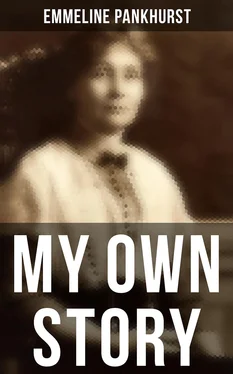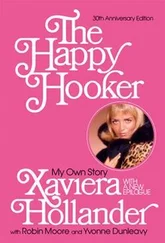To our custom of public heckling of the responsible members of the hostile Government we added the practice of sending deputations to them for the purpose of presenting orderly arguments in favour of our cause. After Mr. Asquith had shown himself so uninformed as to the objects of the suffragists, we decided to ask him to receive a deputation from the W. S. P. U. To our polite letter Mr. Asquith returned a cold refusal to be interviewed on any subject not connected with his particular office. Whereupon we wrote again, reminding Mr. Asquith that as a member of the Government he was concerned with all questions likely to be dealt with by Parliament. We said that we urgently desired to put our question before him, and that we would send a deputation to his house hoping that he would feel it his duty to receive us.
Our first deputation was told that Mr. Asquith was not at home. He had, in fact, escaped from the house through the back door, and had sped away in a fast motor-car. Two days later we sent a larger deputation, of about thirty women, to his house in Cavendish Square. To be accurate, the deputation got as near the house as the entrance to Cavendish Square; there the women met a strong force of police, who told them that they would not be permitted to go farther.
Many of the women were carrying little "Votes for Women" banners, and these the police tore from them, in some cases with blows and insults. Seeing this, the leader of the deputation cried out: "We will go forward. You have no right to strike women like that." The reply, from a policeman near her, was a blow in the face. She screamed with pain and indignation, whereupon the man grasped her by the throat and choked her against the park railings until she was blue in the face. The young woman struggled and fought back, and for this she was arrested on a charge of assaulting the police. Three other women were arrested, one because, in spite of the police, she succeeded in ringing Mr. Asquith's door-bell and another because she protested against the laughter of some ladies who watched the affair from a drawing-room window. She was a poor working-woman, and it seemed to her a terrible thing that rich and protected women should ridicule a cause that to her was so profoundly serious. The fourth woman was taken in charge, because after she had been pushed off the pavement, she dared to step back. Charged with disorderly conduct, these women were sentenced to six weeks in the Second Division. They were given the option of a fine, it is true, but the payment of a fine would have been an acknowledgment of guilt, which made such a course impossible. The leader of the deputation was given a two months' sentence, with the option of a fine of ten pounds. She, too, refused to pay, and was sent to prison; but some unknown friend paid the fine secretly, and she was released before the expiration of her sentence.
About the time these things were happening in London, similar violence was offered our women in Manchester, where John Burns, Lloyd-George, and Winston Churchill, all three Cabinet Ministers, were addressing a great Liberal demonstration. The women were there, as usual, to ask government support for our measure. There, too, they were thrown out of the meeting, and three of them were sent to prison.
There are people in England, plenty of them, who will tell you that the Suffragettes were sent to prison for destroying property. The fact is that hundreds of women were arrested for exactly such offences as I have described before it ever occurred to any of us to destroy property. We were determined, at the beginning of our movement, that we would make ourselves heard, that we would force the Government to take up our question and answer it by action in Parliament. Perhaps you will see some parallel to our case in the stand taken in Massachusetts by the early Abolitionists, Wendell Phillips and William Lloyd Garrison. They, too, had to fight bitterly, to face insult and arrest, because they insisted on being heard. And they were heard; and so, in time, were we.
I think we began to be noticed in earnest after our first success in opposing a Liberal candidate. This was in a by-election held at Cockermouth in August, 1906. I shall have to explain that a by-election is a local election to fill a vacancy in Parliament caused by a death or a resignation. The verdict of a by-election is considered as either an indorsement or a censure of the manner in which the Government have fulfilled their pre-election pledges. So we went to Cockermouth and told the voters how the Liberal party had fulfilled its pledges of democracy and lived up to its avowed belief in the rights of all the people. We told them of the arrests in London and Manchester, of the shameful treatment of women in Liberal meetings, and we asked them to censure the Government who had answered so brutally our demand for a vote. We told them that the only rebuke that the politicians would notice was a lost seat in Parliament, and that on that ground we asked them to defeat the Liberal candidate.
How we were ridiculed! With what scorn the newspapers declared that "those wild women" could never turn a single vote. Yet when the election was over it was found that the Liberal candidate had lost the seat, which, at the general election a little more than a year before, had been won by a majority of 655. This time the Unionist candidate was returned by a majority of 609. Tremendously elated, we hurried our forces off to another by-election.
Now the ridicule was turned to stormy abuse. Mind you, the Liberal Government still refused to notice the women's question; they declared through the Liberal press that the defeat at Cockermouth was insignificant, and that anyhow it wasn't caused by the Suffragettes; yet the Liberal leaders were furiously angry with the W. S. P. U. Many of our members had been Liberals, and it was considered by the men that these women were little better than traitors. They were very foolish and ill-advised, into the bargain, the Liberals said, because the vote, if won at all, must be gained from the Liberal party; and how did the women suppose the Liberal party would ever give the vote to open and avowed enemies? This sage argument was used also by the women Liberals and the constitutional suffragists. They advised us that the proper way was to work for the party. We retorted that we had done that unsuccessfully for too many years already, and persisted with the opposite method of persuasion.
Throughout the summer and autumn we devoted ourselves to the by-election work, sometimes actually defeating the Liberal candidate, sometimes reducing the Liberal majority, and always raising a tremendous sensation and gaining hundreds of new members to the Union. In almost every neighbourhood we visited we left the nucleus of a local union, so that before the year was out we had branches all over England and many in Scotland and Wales. I especially remember a by-election in Wales at which Mr. Samuel Evans, who had accepted an officership under the Crown, had to stand for re-election. Unfortunately no candidate had been brought out against him. So there was nothing for my companions and me to do but make his campaign as lively as possible. Mr.—now Sir Samuel—Evans was the man who had incensed women by talking out a suffrage resolution introduced into the House by Keir Hardie. So we went to two of his meetings and literally talked him out, breaking up the gatherings amid the laughter and cheers of delighted crowds.
On October 23d Parliament met for its autumn session, and we led a deputation to the House of Commons in another effort to induce the Government to take action on woman suffrage. In accordance with orders given the police, only twenty of us were admitted to the Strangers' Lobby. We sent in for the chief Liberal whip, and asked him to take a message to the Prime Minister, the message being the usual request to grant women the vote that session. We also asked the Prime Minister if he intended to include the registration of qualified women voters in the provisions of the plural voting bill, then under consideration. The Liberal whip came back with the reply that nothing could be done for women that session.
Читать дальше












